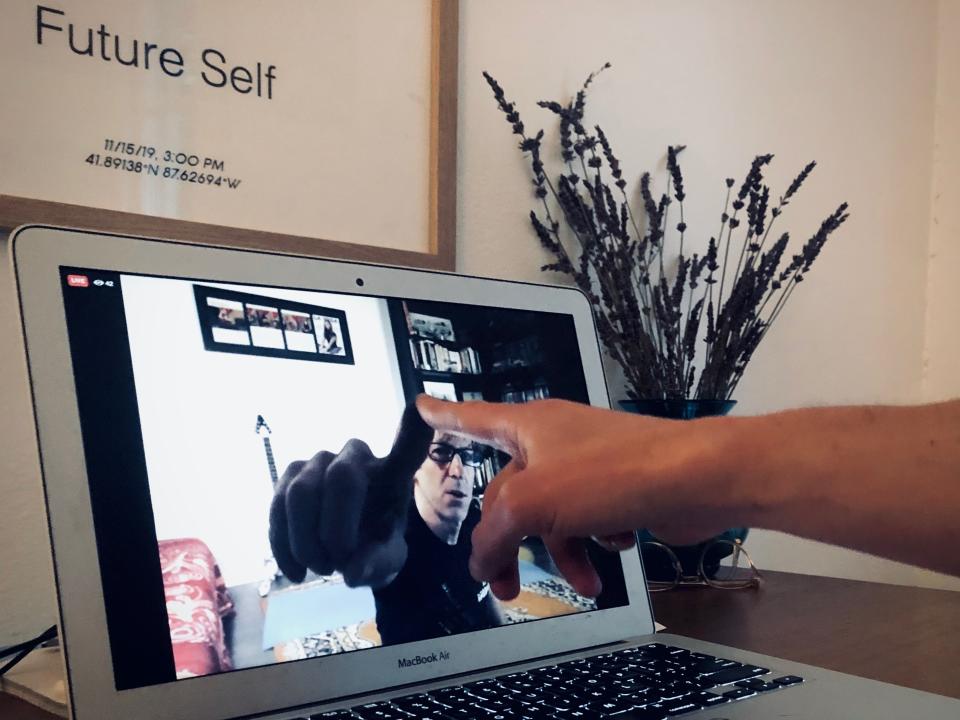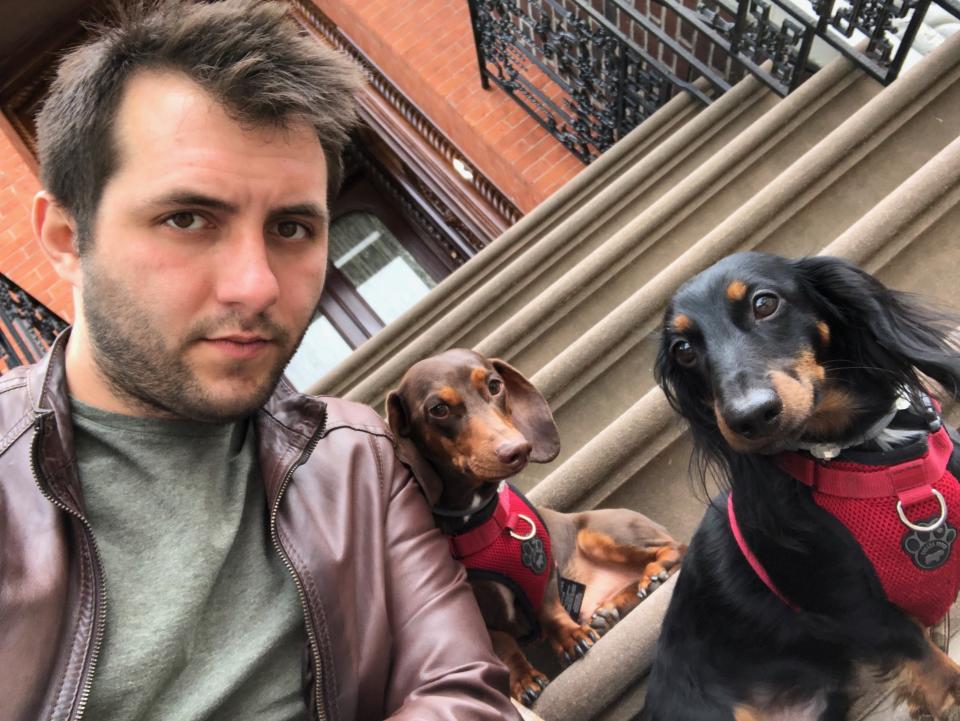'I feel lost': America's freelancers left without income amid coronavirus financial crisis
In between nightly stand-up comedy sets, Ronn Vigh worked part-time as a talent coordinator and taught yoga at three different studios. He had finally found a delicate balance of pursuing his dreams and achieving financial stability.
Within a matter of days, Vigh, 40, was left completely in the lurch as San Francisco implemented a shelter-in-place order in response to the novel coronavirus pandemic.
“In the past, this was enough to keep me financially safe if one gig disappeared, like if I had a sparse month for comedy bookings or classes had to get canceled for some reason. However, this unprecedented shutdown has really thrown a wrench into all of that, and there is no longer a safety net,” he said.
As COVID-19 has dismantled the economy, millions of Americans are out of work, and instead facing deep financial anxiety. On Friday, the Department of Labor reported that 701,000 people lost their jobs in March, making it the first time in a decade that the U.S. economy shed more jobs than it added. On Thursday morning, a weekly report on U.S. jobless claims revealed a record 6.65 million Americans filed for unemployment insurance, doubling last week’s record of 3.34 million.
While the newly enacted $2 trillion Coronavirus Aid, Relief, and Economic Security (CARES) Act promises to provide a lifeline for individuals and businesses who are facing economic ruin, emergency funds can’t get into the hands of struggling Americans fast enough. The IRS will start sending $1200 checks (to adults making up to $75,000) on April 9, but many won’t receive theirs for months.
The new bill is taking unprecedented measures to support the country’s freelancers, contractors, and gig workers, who previously didn’t qualify for unemployment. Now, under the temporary temporary assistance program, these nontraditional workers will receive insurance checks and an additional $600 a week, for up to four months.
‘I can’t get through the phone lines’
Americans living in California, the country’s most populous state, and New York, the epicenter of the coronavirus pandemic, are some of the hardest hit, with claims jumping 371% and 358% week-over-week, respectively. But these figures may not fully capture the approximately 16 million self-employed workers, many of whom likely gave up after long wait times.
“I’ve applied for unemployment but just like many people, I can’t get through the phone lines. I’m sure I’ve called over 500 times over the past two weeks. I’ve also applied for food stamps but I got denied for expedited so I have to wait 30 days to get an answer if I’m approved or not,” said Chaellynn, a Brooklyn-based freelance makeup artist.
After making her rent payment on April 1, she has $0 left in her checkings account — and $290 in her savings account, which she’s using sparingly for food. She has been applying for grants and funds for freelancers in the creative industry, but it’s been a demoralizing process.
“Every single one I applied for told me I don’t qualify because I’m a makeup artist. I’m not a painter, sculpter, or glassblower... That kind of hurt because I feel I am a painter, just a different kind, so I feel abandoned not only by the government right now, but by my own creative community. I feel lost. I don’t know when my next check is coming. I’m 26 living in NYC by myself with no family, so I’m on my own,” she added.
‘They are fully staffed’
To be sure, segments of the private sector have stepped up to recruit temporary workers. As retail giants like Amazon (AMZN) and Walmart (WMT) face insatiable demand for groceries and cleaning supplies, they have made commitments to hire hundreds of thousands of employees. But even those short-term jobs have been hard to attain as displaced and furloughed workers compete for a finite number of positions.
In mid-March, Vigh immediately started looking for jobs, and applied to roles at Amazon and its subsidiary Whole Foods.
“I was asked if I could start immediately and was excited about the possibility of having some stable income even if it was not ideal. Then both those processes led to an impasse. I had a final in-store meeting interview scheduled when the coordinator wrote back and said ‘I was just notified that they are fully staffed,’” he said.
Americans like Vigh, who had hedged their own careers, cobbling together several jobs to stay afloat, are now found completely dumbfounded by the future.

‘0% dog walking, 100% alternative services’
For many gig workers, their primary product is selling an in-person, hands on experience, which is being strongly discouraged or banned during this time of social distancing.
Mike Chiaravalloti, 29, is the founder of Sticks & Bones, a dog-walking business in New York City. Prior to the pandemic, he had 14 employees in the rotation, doing a collective 65 walks per day. That number halved in mid-March, and now all clients have stopped using his services.
“We’re officially down to zero walks per week. Out of 14 walkers, all the part-timers (six of them) have been told and understand, there’s no work. Of the remaining eight, all but one are self-quarantining to prevent the spread. I have one guy who will still go out, and we have mostly been checking on people’s apartments to bring up deliveries/water plants, because they left town. Therefore, 0% dog walking, 100% alternative services,” he said.
Travis Peck, 28, a hair stylist at Muze Salon and instructor at Wella Professionals in New York City, feels the despair reverberating across the beauty industry. Both his jobs came to an abrupt halt in mid-March, and his livelihood depends on a la carte services with a heavy reliance on tips.
“Our jobs are based on physical contact… so staying six feet away from everybody is just crazy — there’s nothing that we can really do. I can’t make any money right now,” he said.
“Luckily, my grandmother raised me right. I've prepared myself. I've always kept my savings account for emergency scenarios, so I’ll be alright for two to three months, though this could go on for a lot longer.”

Many of Peck’s peers have been dedicating their newly found free time to creating content to consume at home, starting movements like #ShowYourRoots and raising support and funds for hairstylists.
“At this moment I've been inspired to do things on Instagram — showing you how to blow out your own hair, do things yourself, feel really good on the outside. Being a beauty professional, my job has always been to help people express themselves on the outside. There’s some positivity to be had — it’s brought a smile to my face to hear from clients,” he said
Still, Peck's endeavor is enjoyable, but not determinately monetizable. Celebrity makeup artists and fitness studios and individual instructors with massive platforms are better positioned during this online-only era, as they’re able to harness their existing communities and charge weekly or monthly fees for video on-demand subscriptions.
Juan Gonzalez, a 33-year-old personal boxing coach in Santa Monica, Calif., is doing some online training, but admits he has visited a few clients to make money despite the stay-at-home orders. He submitted an unemployment claim, but doesn’t know if and when he’ll be receiving a check.
“Not everyone wants to do online workouts, and I can’t sit around and wait for the government to help. I’d rather be proactive and help myself to the best of my ability while using common sense such as washing my hands frequently, and I carry around hand sanitizer.”
“I have $10,000 saved and my plan is to continue doing home visits and online training until I can return to the gym. My wife and I will use our savings for as long as we can and if we run out, we may have to leave our apartment and move in with our parents,” added Gonzalez.
Sustaining the generous spirit
But a few smaller players like yoga instructor Daniel Overberger have found some success in moving their communities online, where he is streaming live classes. Several of his long standing clients are contributing donations.
“My earnings have been cut by 65%. Clearly it is not sustainable as is. Luckily, since I do not have a boss, I set aside a small cash reserve and can sustain myself for a short time. It's something we all should try to do,” he said.
Fellow yogi Vigh has been working with one of the studios to record a few instructional videos. After it was posted, he received three Venmo donations from students.
“More important than [the money] are the messages of gratitude and how those classes have helped them during this period. That is the primary inspiration to move forward in trying to teach online Zoom classes this week, though I won't pretend that the money isn't wanted either. Nobody ever gets into teaching yoga or doing stand-up for the money though,” he said.
“They are not lucrative careers as the markets for both are completely saturated and you need to be at the top one percent. That said, a lot of local gigs wind up paying you tips. About a year ago I decided not to touch the money that comes into those accounts and use them as a rainy day fund. As a result, I have $1200 sitting in Venmo.”
Chiaravalloti, the dogwalker, said he feels fortunate to have loyal clients who are constantly looking out for him. Three dog owners continue to donate to him every week, six others are tipping him regularly, and one couple negotiated a deal that would translate into credit later.
Several others have offered to pay him for future walks, but he doesn’t think it’s necessary just yet.
For Peck, the stylist, the experience of being out-of-work has made many clients realize just how much they rely on his services. He gets texts from some showing their long hair and graying roots, and many are still tipping him.
“The systems that rely on us to support them are the same systems that are crushed without us. This has really been brought to the surface,” said Peck. “The best outcome out of this would be if we really learned something about how to treat people.”
________
Melody Hahm is Yahoo Finance’s west coast correspondent, covering entrepreneurship, technology and culture. Follow her on Twitter @melodyhahm.
Read more:
‘When it comes down to it, it’s your neighbors who save you’: Nextdoor CEO
Land O’Lakes CEO: Rural America is the new inner city
2020 candidates are ‘dumbfounded’ on how to solve homelessness: LA Mission CEO
How Disney and Apple are challenging Netflix’s binge-watching model